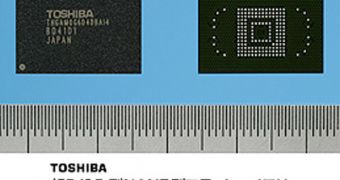Flash memory chips are very popular nowadays and they are used in many commercially available applications, ranging from music players to cameras and dedicated storage devices like memory sticks or being used to improve the qualities of other computer hardware parts as is the case with the hybrid hard disk drives.
As the popularity of the flash memory chips grows and their use is increasing by the month, so does the need for bigger capacity chips, as the industry constantly needs flash memory chips with bigger and bigger storage capabilities, while also putting some accent on the increase in data transferring features and the decrease of latencies. In order to address this demand, flash memory manufacturing companies are switching one by one to smaller fabrication processes, just like the Japanese company Toshiba announced that will do.
According to the new site zdnet, Toshiba will start mass producing flash memory chips based on the 30 nanometer fabrication process by 2009 in order to be able to fend off the Korean company Samsung Electronics. Using the 30 nanometer flash memory chips Toshiba could gain an advantage over its rival company as Samsung did not announce plans for upgrading its memory production lines. At the present the Japanese computer hardware manufacturing company Toshiba is considered to be the second largest producer of flash memory chips and by reducing its production costs it hopes to close in or even demote Samsung from its leading place.
Right now, Toshiba is set to start mass producing flash memory chips using the 43 nanometer fabrication process at its Yokkaichi plant in central Japan and the 30nm production lines are expected to be built at the same location. Since the smaller fabrication process can lead to lower manufacturing costs, smaller overall chips size and increased data storage density, Toshiba is very likely to start building its 30 nanometer production lines as soon as possible.

 14 DAY TRIAL //
14 DAY TRIAL //